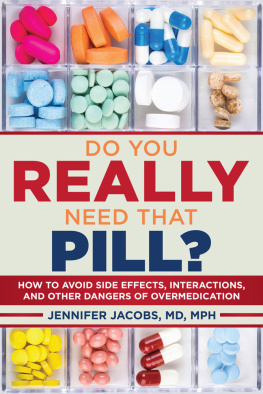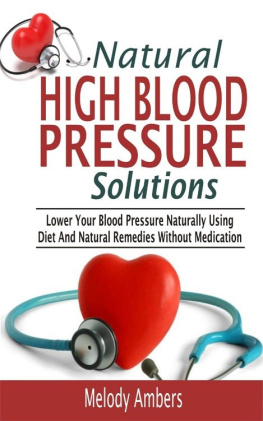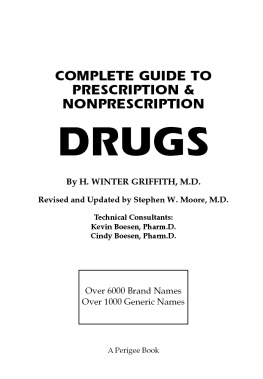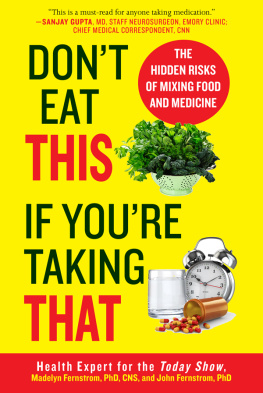

Copyright 2018 by Jennifer Jacobs, MD, MPH
Foreword 2018 by David L. Katz, MD, MPH, FACPM, FACP, FACLM
All rights reserved. No part of this book may be reproduced in any manner without the express written consent of the publisher, except in the case of brief excerpts in critical reviews or articles. All inquiries should be addressed to Skyhorse Publishing, 307 West 36th Street, 11th Floor, New York, NY 10018.
Skyhorse Publishing books may be purchased in bulk at special discounts for sales promotion, corporate gifts, fund-raising, or educational purposes. Special editions can also be created to specifications. For details, contact the Special Sales Department, Skyhorse Publishing, 307 West 36th Street, 11th Floor, New York, NY 10018 or .
Skyhorse and Skyhorse Publishing are registered trademarks of Skyhorse Publishing, Inc., a Delaware corporation.
Visit our website at www.skyhorsepublishing.com.
10 9 8 7 6 5 4 3 2 1
Library of Congress Cataloging-in-Publication Data is available on file.
Cover design by Rain Saukas
Print ISBN: 978-1-5107-1564-6
Ebook ISBN: 978-1-5107-1565-3
Printed in the United States of America
The information provided in this book is the result of extensive research into the medical literature. It is intended only as a reference for those who want to learn more about the risks and benefits of medications for many common disorders. The decision as to whether or not to take a drug should be made, as always, by each individual in collaboration with his or her medical provider.
For Jacob, who was born and grew along with this book.
Table of Contents
Foreword
I suspect all of us have some (and most of us have abundant) reason to appreciate the remarkable prowess of modern medicine. I routinely ask members of my audiences to raise their hands if a loved one has been touched by heart disease, cancer, stroke, or diabetesjust several of the most prevalent chronic diseases and leading proximal causes of premature death in industrialized societies around the world. By the time I complete that short list, every person in every auditorium with very rare exceptions has a hand in the air.
Those hands, representing people we love, are all the reason most of us need to respect ongoing advances in biomedical science. We are beneficiaries of new drugs and new technologies that can, and do, save lives. Heart attacks can now be aborted as they occur, rather than observed with passive dismay as they were only decades ago. The same is sometimes true of strokes; they, too, can be aborted before doing permanent damage. Type 2 diabetes is treated ever more effectively with ever safer drugs. Cancer mortality rates are declining steadily with advances in chemotherapy.
My family is certainly among the innumerable beneficiaries of modern medical technology and pharmacotherapy; as am I, personally. When I contracted anaplasmosis (a potentially lethal tick-borne illness), I was very grateful for the infusion of antibiotics that produced a full and fairly prompt recovery. When I tore my ACL (and sometime later, my other ACL ), I was grateful for the skill of my orthopedic surgeon, the technological advances that led to arthroscopy (joint surgery performed with a fiber-optic viewing device), and the modern anesthesia that let me sleep blissfully until it was all over. (Waking up to the pain afterward was not much fun!)
And finally, as an internist who has cared for patients for most of the past twenty-five years, I have made routine use of diverse medications and know for sure in many casesand hope in many othersto have done much good and provided genuinely needed help as a result.
But Jennifer Jacobs is quite right that overuse of medication in our culture is a serious problem. She is quite right that the benefits of medication may be the tip of a proverbial iceberg, made highly visible and positioned in the most favorable light through the efforts of Big Pharma and their Madison Avenue representatives. The bulk of the story may well lie below the waterline. In this book, Dr. Jacobs shines a light where it is most needed, where the shadows tend to be densest. She is quite right to ask you to ask: do you really need that pill? As our nation struggles to confront an opioid addiction epidemic that is among the great crises of modern public health, this book could scarcely be more timely.
I have long shared this concern with Dr. Jacobs. As a specialist in lifestyle medicine, disease prevention, and health promotion, I am among those concerned with the divide between the health care system of which we speak, and the disease care system we actually have. We tend to wait for disease we know how to prevent routinely with healthy lifestyle practices to develop, and then treat it with drugs. The situation is one step more ominous than that: our culture generates corporate profits by marketing willfully addictive junk food that makes people sick, and then more corporate profits by marketing the drugs to treat the rampant chronic disease we didnt need to get in the first place.
By and large, we have a disease care system, and since all systems have a vested interest in propagating and perpetuating themselves, this one has a vested and pernicious interest in prevalent disease. There is no shortage of actual disease, alas, but the system takes no chances. At times, as Dr. Jacobs notes, disease is invented to justify the use of a drug. At times, what was once a variant of normal behavior is redefined as pathology.
I have grappled personally with that last one. My one son is the youngest of my five children. While all of his sisters were very active kids, my sonnow eighteenwas hyperkinetic at a whole different level. My wife and I were well aware that his rambunctiousnessand thats really what it waswas apt to earn him a diagnosis of ADHD, and a Ritalin prescription. We wanted none of that. My son inspired one of my signature rants: the proper remedy for rambunctiousness in a child is recess, not Ritalin! Since I work in public health, we were able to do more than rant, and actually developed, and studied, a program of brief, intermittent activity bursts for application in schools, called A-B-C (Activity Bursts in the Classroom) for Fitness. We made the program freely available, and its now in hundreds if not thousands of schools throughout the United States and the world. And by the way, my son is a perfectly healthy young man, headed off to collegeand no, he never took Ritalin.
As Dr. Jacobs describes in detail, the problem is poignant in children, but more prevalent and often even more urgent in older adults. Most disease care is concentrated in our later years, and much of the prevailing pharmacotherapy is concentrated there as well. Combine a culture prone to overmedicalize, with genuinely prevalent chronic disease, plus a system in which specialists may tend to treat a condition or body part rather than the whole person, and you have a perfect formula for polypharmacy-induced mayhem.
This book provides expert guidance on navigating past just that peril.
There are, at times, kinder, gentler, safer, and very effective alternatives to medications. At times, there are not. There is a sentiment in the modern world that natural is synonymous with safe, but that is misguided. Rattlesnake venom and botulinum toxin are natural. So, too, the smallpox virus, and the polio virus. The vaccines that have eradicated smallpox and nearly eradicated polio are, of course, science; as is the germ theory that enabled us to understand the underlying cause and effect in the first place.
Next page






